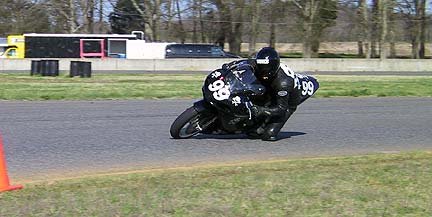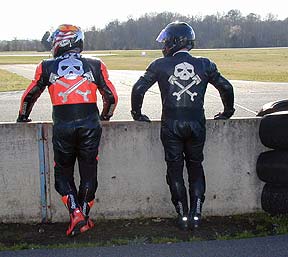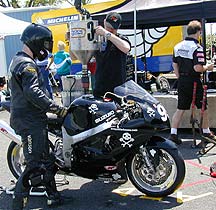2002 – Part One
Army Of Darkness has been contesting the WERA National Endurance series since 1993 with a Middleweight Superbike. After failing miserably for a number of years the team achieved success in 1999, winning the Middleweight Superbike Class Championship and successfully defending it the following two years. Join us now as the AOD pursues:
The Intentional Destruction of
Laboriously Engineered Artifacts: 2002
by Sam Fleming
Army Of Darkness had won its third consecutive WERA Middleweight Superbike National Endurance Championship by the end of the 2001 season. Of course, with racing, it’s not what you’ve done that counts, but what you are going to do.
In January of 2002 we knew the AOD riders were going to be Mark Crozier, Jim Williams and myself. We knew Tim Gooding would once again be building the engines, prepping the chassis, building the quick-change wheel systems and administering the entire system at the track. What we didn’t know was who our competition would be and that made it difficult to gauge how prepared we were for the season. Most things in racing involve a compromise with the heavy side of the scale often being financial considerations. It would be nice to buy expensive forks and wheels but it is best to avoid it unless absolutely required to win races. And, with every modification comes the itinerant danger of component failure or installation mishap.

From Left: Mark Crozier, Nolan Ballew, Jim Williams, Tim Gooding, Sam Fleming
We decided to take the conservative route and stuck with basically stock equipment which had been suitably modified for endurance racing. We had conceptualized a theory that the most time we could make up at the racetrack was not in faster laps times as an absolute, but in faster average lap times. We figured that there wasn’t much use in building a bike that could turn faster lap times on an open track because, in endurance racing (and especially with the reintroduction of the SV class), you rarely ever get a clean lap. Usually at some point you have to pass another bike. The efficiency of that pass will be directly related to the average lap time at the end of the stint. We decided to focus our modification efforts at building a bike that would facilitate passing with an emphasis on torque, nimble handling and forgiving suspension.
Tim handled the torque with some help from M4 exhaust pipes and a Dynojet Power Commander and hours of cam research and timing. We made our own injection maps using a Dynojet Tuning Link system. Traxxion Dynamics base-lined the suspension for us. We found the nimble handling mostly through a day of trial-and-error during AOD pre-season testing at Talladega. We experimented and found a combination of Michelin tires (profile, carcasses and compound) which most effectively suited our forgiving suspension set-up. After using a few different sprocket manufacturers we have found that Sprocket Specialists tend to have the longest lasting gear wheels. Despite also backing our fiercest competitors, Vesrah is our current choice of brake pad.

Testing front tires in the pre-season at Talladega.
Satisfied with the bike and the talent we concluded our test quietly confident that we would be able to field a worthy defense of the title. And then we found out who we would be racing against. Suzuki would be supporting not one but two teams in WERA’s Middleweight Superbike class, both of them racing against us.
Team One we were not overly concerned with but we have found in racing it is best to take nothing for granted. Team one was 14k the Movie. Their website declared:
"We are fully supported by Suzuki USA with all the racebikes for the movie teams.
"Suzuki has agreed to support our marketing effort by giving the movie exposure through all the channels open to them, i.e. television, mainstream advertising, website, posters and newsletters sent to all Suzuki dealerships throughout the United States."
Our movie-making friends pointed out that, if one was trying to make a movie, one would focus on making a movie, not spending time, money and resources on fielding a race team. However, even though the team sounded fishy, the fact that they were apparently receiving full support from Suzuki and a variety of other suppliers suggested that we should at least take them seriously.

Mark Crozier models his 2002 line of AOD leathers
against the more classic look, earning him the
moniker "Pumpkin" for the duration of the season.
Team Two was Vesrah Suzuki II. Vesrah Suzuki is the heir to Suzuki’s support in the WERA endurance series, a mantle that was handed down from Team Suzuki Endurance to Arclight Suzuki to Vesrah Suzuki. Vesrah is by far the largest team in WERA endurance with the best riders and the best equipment. They have paid mechanics to prepare the bikes and paid riders to ride the bikes. Vesrah would be fielding two teams for 2002, a Heavyweight Superbike team to win the overall championship and a Middleweight Superbike team to defeat us. Riding the Middleweight bike would be David Yakov, Darryl Saylor, Rueben Frankenfield and two riders who had, in the past, ridden with AOD: Mark Junge and Brian Stokes. Top-shelf riders on top-shelf equipment backed by the Suzuki factory. Additional motivation was supplied by the continuance of a bounty placed on our Michelin heads by Pirelli.
Faced with sea of yellow bikes and stacks of Pirelli tires, it seemed a foregone conclusion to all involved that Vesrah would be able to handily walk right over our motley crew of volunteers and scratched bikes. Two of the Vesrah II riders actually apologized to us before the first race for the trouncing they were going to deliver. The danger to Vesrah and Pirelli, of course, was the off-chance that they lose a race, or worse, the Championship. Aside from having your pants fall off on the swingset at recess, few life events are more humiliating than losing a motorcycle race to Army Of Darkness.
Joining AOD on the road and in the pits would be Neighbor of the Beast (667) contesting the Middleweight Supersport class with Melissa Berkoff, Scott Fisher and Jeff Walker.
No Problem Raceway
Belle Rose, Louisiana
April 6th, 2002
•••••••••••••••••••••••
This was the WERA Nationals’ first visit to NPR. NPR has a nice, flowing layout which, unfortunately, is bracketed by a fair number of walls, no place for pit signals, and a sort of hokey pit arrangements. On the plus side they have a restaurant at the end of the front straight and some of the friendliest track folks around.
Sadly, our new teammate Mark Crozier was not going to be able to make the first race of the year due to the early arrival of his third daughter. This would leave the riding to Jim and I.
We also got a good look at this season’s competition. 14k the Movie was a little less than impressive since, although they had very pretty racebikes, they did not seem to be very organized and were still angling for a tire deal during Friday practice. Vesrah II, however, looked daunting. Underneath a spread of yellow canopies, their GSX-R600 was sporting Ohlins forks, a GSX-R750 swingarm, a big gas tank and quick-change wheels front and rear. Mark Junge confided in us that it was the best-handling 600 he had ridden but assured us that he had bigger fish to fry and that he would not be riding the 600 in the endurance series. This turned out to be either intentional misdirection or Mark underestimating his own desire to win double Championships.

Zero percent financing meets the Army Of Darkness.
Our new trailer, which looked massive in the driveway, was dwarfed by their transporter. Our lovingly-prepared bike suddenly looked woefully inadequate. And their professional crew revealed us for what we are: A bunch of enthusiasts playing racers in our spare time on weekends. It did not bode well for the race or the season. Jim and I discussed how we needed to be process oriented (i.e., run our best race), not goal oriented (win the race) because, when faced with insurmountable odds, goal orientation is a sure path to frustration and despair. In the midst of this discussion, Vesrah’s Nancy Junge graced us with a sponsor package of Vesrah brake pads, oil filters and clutch plates. It makes it harder to demonize your opponents when they are giving you brake pads.
Adding to the Middleweight Superbike mix was Bent Racing in the house from Texas. They had been running practices days and races at NPR for months and had the track wired and their bike working well. As both Bent riders were going faster than Jim and I at NPR it was welcome news that they would not be contesting the entire WERA series.
Despite Mark Junge’s early reassurance that he would not be riding the Vesrah 600, he was on the bike at the start of the race and quickly gapped the rest of the Middleweight field, keeping pace with his teammate, Tray Batey on the Vesrah GSX-R1000. About 30 seconds back, Jim Williams, on the AOD bike, was following Jim Bishop on the Bent Racing GSX-R600.
It is a well-documented fact that Jim Williams can only get one good race start on any given weekend and he will be assured of botching any restarts. An early red flag gave us an opportunity to see that this phenomena had survived a winter dormancy period to flourish in 2002. He didn’t get a good restart and had to work hard to catch back up to Jim Bishop.

Jim Williams (99) leads eventual third-place
Northern Getaway (39) and 17th-place WFO (137) at NPR.
After the first round of pit stops I took to the track in third place overall following the two Vesrah bikes. Reuben Frankenfield took over the Vesrah II bike but highsided it when the two of us split a backmarker through one of the slow turns. Being a veteran endurance racer, Reuben doesn’t let a little thing like a highside deter him and he quickly picked up the bike and rode it back to the pits for repairs. The team did, however, lose four laps.
I couldn’t match Bent’s pace and, after 90 minutes, pitted for a new tire and a full tank. Jim retook the track in fourth place (behind two 1000s and Bent) but, equipped with a fresh Michelin rear, he was three seconds a lap faster than third place and four seconds a lap faster than second. I broke out the calculator and figured that we would be in second place overall within 15 minutes and would hold it to the end of the race.
I had just about finished counting all the chickens when the eggs were all crushed by a red flag and the race was ended prematurely, sticking us in second in class, fourth overall. Our sister team Neighbor of the Beast was caught in fourth place with a full tank of gas while the three teams ahead of them were all running on empty. They were on the same lap as the other three MWSS teams but they had taken their final pit stop which the other teams had not. The red flag stranded them in fourth. This taught us an important lesson: If at all possible, be leading the race for the last 45 minutes on the off chance that a red flag ends the festivities prematurely.

With the 5-minute board up, Tim Gooding
tops off the fuel while Max McAllister
turns away in disgust.
We were left with a bit of a sense of racious interuptious but gradually it sunk in that, although the finish could have been better, we had, as a team, performed very well and beaten both of our rival teams in the first race. It was definitely a fluke since Vesrah II was beating us until they crashed but, the last time I checked, the points are determined by the running order at the finish.
